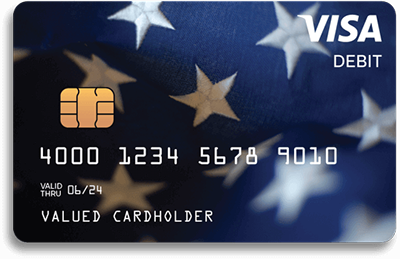
Economic Impact Payment Debit Cards
Frequently Asked Questions
The Department of Treasury is now issuing Economic Impact Payments (EIP) by prepaid debit card versus a paper check. Downeast Credit Union realizes this new delivery method may create some confusion so we have worked with the Maine Credit Union League to develop a list of FAQs to help answer questions regarding the use of stimulus debit cards.
Q. Why am I receiving a debit card instead of a paper check?
This decision is based on an election made by the federal government that takes into account the location of where your tax return was processed.
Q. I just received my debit card, how do I begin using it?
Before using your Economic Impact Payment Card, you will need to activate it by calling 1-800-240-8100 (TTY: 1-800-241-9100). When activating your card, you will be asked to create a 4-digit PIN.
Q. How can I use the card?
The prepaid debit card can be used to make purchases online or at any retail location that accepts VISA. If you set up an account at eipcard.com, you will be able to log in to the site at any time to check your debit card’s balance. You also can check your balance by calling 1-800-240-8100. You’ll need the number on the front of the card when you make the call.
Q. Can I use the card at an ATM?
Yes. There are two ways to do this. First, you can use any in-network Money Network ATM, in which case you will not be charged a fee. You can find in-network ATMs at most CVS, Walgreens, Rite Aid, Shaws, Big Apple, and other stores. Use the ATM Locator https://www.eipcard.com/locator to find an in-network ATM near you. Second, you can use an ATM that is not in-network. MetaBank, the card’s issuer, will allow you to do one cash withdrawal at an out-of-network ATM for free, after which withdrawals are $2.00 per transaction. Also, because these are not credit union debit cards, it is highly likely you will be charged a surcharge fee by the institution that owns the ATM, even if it is your own credit union. In other words, when making your first out-of-network ATM withdrawal, you may be charged a fee only by the financial institution that owns the ATM. After that, you may be charged two fees—one from the ATM’s financial institution and one from MetaBank.
Q. Can I withdraw the full balance on the card through an ATM for cash?
Yes, but most ATMs limit the amount of cash withdrawn at one time. Limits range from $500 – $1,000. If your debit card has a balance of $1,200, you might need to make multiple trips to the ATM over multiple days to withdraw the full amount. Keep in mind, you can incur a fee for out-of-network ATM withdrawals. To take the full cash amount out at one time, transfer the funds into your checking account using the eipcard website. Then, visit your credit union to withdraw the amount after the funds have been posted to your account.
Q. Can I deposit the funds on my card into my credit union checking account?
Yes. There are two ways to deposit the funds with your financial institution. First, you can transfer money online from the card to your credit union account by creating an account at eipcard.com and following the directions to “Move Money Out.” You’ll need your credit union’s routing number and your account number to complete this transfer. The transferred amount will show up in your credit union account in one to two business days. Second, you can request a cash advance from your credit union for up to the full dollar amount on your card. The balance on your card will be reduced by the amount of the cash advance. The credit union will then deposit the funds into your checking account. If you request multiple cash advances in smaller increments, keep in mind MetaBank could charge a $5 fee per transaction.
Q. What if my debit card has two names on it, such as mine and my spouse’s?
Our credit union requires that both parties be present for a deposit or cash advance.
Q. If I use my debit card, will I be charged any fees?
The EIP prepaid cards do not have a monthly maintenance fee or point-of-sale transaction fees, so you will not be charged a fee if you use the card in a retail store, restaurant, or other location that accepts VISA. But there are some fees to be aware of including:
Again, the best way to avoid any fees is to set up an account on the eipcard.com website and transfer the funds to your credit union checking account.
Q. What happens if I lose my card?
Individuals who have lost or destroyed their EIP Card may request a free replacement through MetaBank® Customer Service. The standard fee of $7.50 will be waived for the first reissuance of any EIP Card. Any initial reissuance fee charged to a customer from an earlier date will be reversed. Individuals do not need to know their card number to request a replacement. Individuals may request a replacement by phone at 800-240-8100 (option 2 from main menu).
The Economic Impact Payment Card is sponsored by the Treasury Department’s Bureau of the Fiscal Service, managed by Money Network Financial, LLC and issued by Treasury’s financial agent, MetaBank®, N.A. If you receive an Economic Impact Payment Card, it will arrive in a plain envelope from “Money Network Cardholder Services.” The Visa name will appear on the front of the Card; the back of the Card has the name of the issuing bank, MetaBank®, N.A. Information included with the Card will explain that the card is your Economic Impact Payment Card.
Refer to the EIP Card Website for additional details, or visit the IRS Economic Impact Payment Information Center for answers to payment questions.